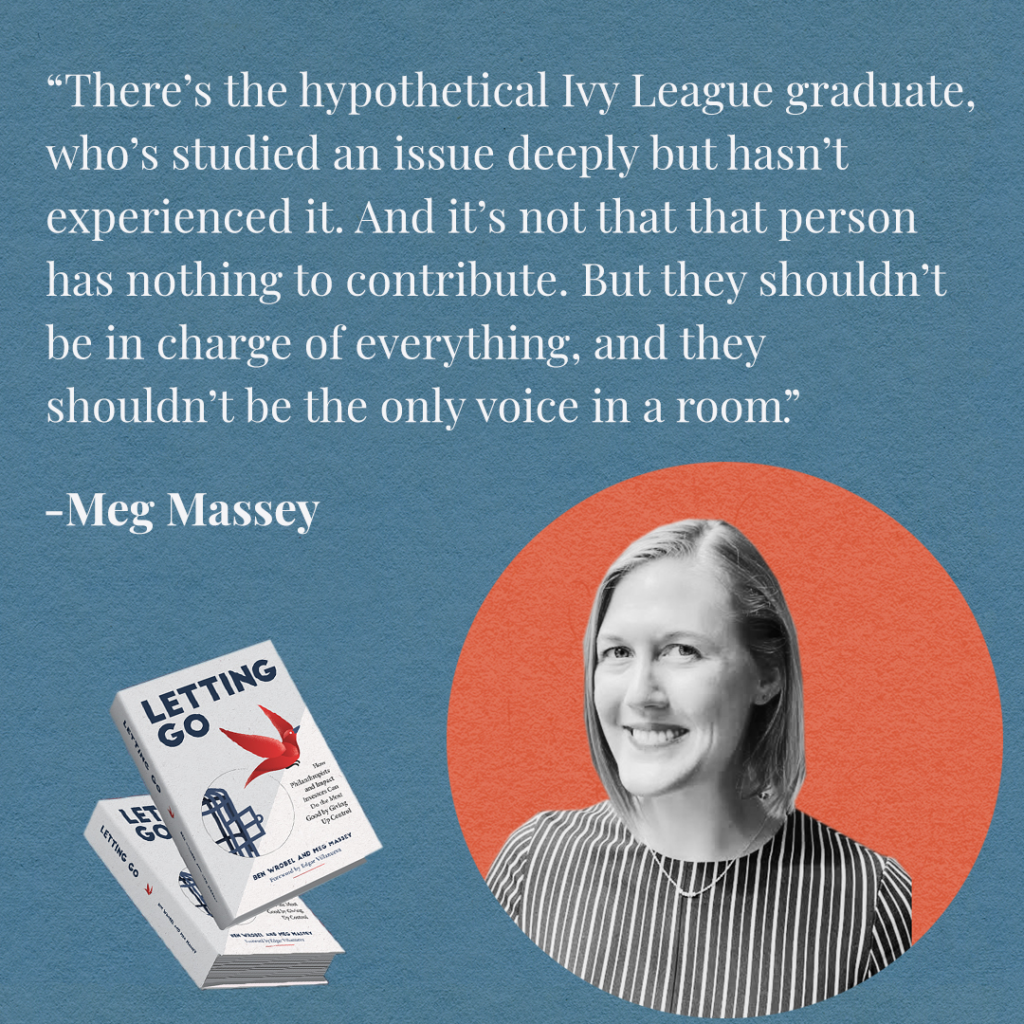The Future of Philanthropy: Steering Away From a Culture of Gatekeeping
Recently, we shared our views on what needs to be done—and the necessary mindset shifts that are so crucial among funders—for capitalism to become a force for good. Venture philanthropists need to meet with social entrepreneurs who have clearly demonstrated their ability to generate systemic change, and give them some freedom to do their job—instead of limiting their potential. They also need to act with far greater urgency, give in greater percentages (even akin to the average American), and place more women in decision making roles.
But what now? What roadblocks are truly getting in the way of making this happen? We believe it has a lot to do with existing organizational and individual power structures, a risk-averse mindset, a lack of women in leadership, and not prioritizing or placing bigger bets—those that reflect today’s available capital resources, which carry enough weight to really address global inequality. Additionally, there continues to be little or no sense of urgency to make this happen on a timeline that matches the issues.
Ceding Power
The top-heavy, insular nature of philanthropic organizations today poses steep challenges when it comes to funding certain projects—often the ones that hold large-scale promise. Grant-making foundations often find themselves tied to rigid budgets, closed-door decision-making structures, and permissible program areas. In theory, foundations are among the most flexible institutions for allocating money to social change. But in reality, they’re often constrained in their ability to shift resources and have too many decision-makers. Foundations—along with companies looking to optimize their philanthropy—need less to do more. They need lean teams empowered to make decisions quickly, and with a mandate to think outside the box—as well as a portfolio of dedicated grantees that have passed every due diligence test, and are ready to be funded as organizations instead of projects. These institutions should be prioritizing opportunities that attract more capital from the capital markets and remove barriers for people living in poverty—enabling them to participate as customers and take charge of their own lives. Instead, foundations often have a gate-keeping culture that strives to place ideas and initiatives in boxes—versus looking at the bigger picture, and helping social entrepreneurs change the underlying systems that reinforce inequality. By extension, they limit the potential of social entrepreneurs and non-profits to scale their impact.
When we recently spoke with Ben Wrobel and Meg Massey—who co-authored the book Letting Go: How Philanthropists and Impact Investors Can Do More Good by Giving Up Control. They posed the idea of participatory funding as a facilitator of systems change. Essentially, said Wrobel, it’s “the process of shifting decision-making power over grant-making or investing to the very communities most affected by them. It’s a structural fix to the broken power dynamics in traditional funding.”
They believe it’s paramount for grant makers and investors to "let go" by ceding decision-making power to people who have lived experience of the problem at hand. But they also believe this model extends to the philanthropic organizations themselves, which need to let go of the hierarchical structures that have historically constrained their ability to make the greatest impact. And that starts with bringing in people from the areas being directly served—for example, a small business loan fund in Boston that is entirely controlled by working-class residents.

“There’s the hypothetical Ivy League graduate, who’s studied an issue deeply but hasn’t experienced it. And it’s not that that person has nothing to contribute. But they shouldn’t be in charge of everything, and they shouldn’t be the only voice in a room,” said Massey. “Their academic expertise should be balanced with lived experience, treated as expertise. Living in a neighborhood your whole life is the equivalent of a PhD in that neighborhood. It’s essential to first build trust with the community you’re serving.”
Leaving the Little Kids’ Pool
Philanthropy is endlessly playing in the little kid’s pool, where all of the players are crowded in—debating how a $1 million restricted grant can make ripples against trillion-dollar challenges, and endlessly discussing a list of 30 key performance indicators. This approach yields the same results over and over again: limited impact, inefficient or wasted resources, constrained potential by those doing the work, and minimal progress against rising and rampant inequality. Meanwhile, the global business and financial industries are swimming in the adult pool—working with trillions of dollars in resources, and shaping innovative global agendas with an acceptable margin of error (meaning it’s okay for some ideas to fail, while others succeed). In 2021, there is no bridge between this little kids’ pool and the adult pool. What does that say about our priorities and how we allocate the world’s greatest resources to address poverty and climate change?
Darren Walker, CEO of the Ford Foundation, recently posed the argument that generosity is insufficient, and the real goal of giving should be justice. “Generosity actually is more about the donor, right? So, when you give money to help a homeless person, you feel good,” he said. “Justice is a deeper engagement where you are actually asking, ‘What are the systemic reasons that put people out onto the streets?’ Generosity makes the donor feel good. Justice implicates the donor.”
He’s talking about the urgent need for systems change—the number one way that philanthropy can solve some of the most pressing problems of our time. But as it stands, the menu of options posed to billionaires is barely big enough to put a Band-Aid on social problems. Most of these billionaires are not meeting with, or listening to, the community of social entrepreneurs and non-profits who are addressing the root cause of issues to create meaningful, long-term change. It’s easy for billionaires to provide funding that helps alleviate symptoms, but tackling issues at their source is a far more complex task. Options for funding the construction of a water well or the operations of a soup kitchen are endless. But when we talk about overhauling water infrastructure or addressing the propellants of homelessness—the social entrepreneurial organizations tackling these issues in innovative ways that demonstrate progress are not getting funded at the levels they need.
Venture philanthropists undoubtedly have the power and influence to shift entire systems. It is imperative that foundations—particularly those among the largest, which have the greatest pull—push the envelope and dedicate much larger capital resources to solutions that have a track record in this making this happen.
Placing Women at the Helm
Moving millions to billions in capital for social good also relies heavily on women. Currently, among the world’s largest foundations and impact investment funds, decision makers tend to be disproportionately privileged white males. And only 12% of venture capital firm decision makers are women. However, research supports the fact that reversing the balance of power in philanthropy and impact investing is not only beneficial—it’s essential. In fact, the World Bank found that when initiatives included women, they were six to seven times more effective than those that did not. Additionally, businesses founded by women deliver double the revenue per dollar invested than those businesses founded by men. And research shows that when women engage in shaping policies and institutions, communities have greater access to health, education, and sustainable water services.
Yet, despite this success—and the critical role they play in designing and executing successful systemic change solutions—women remain largely undermined, underfunded, and underrepresented in key roles and negotiations. Ensuring there are more women in decision-making roles across every industry represents a much-needed shift toward the transformational leadership that is needed today.
Capitalism will not evolve and become a force for good if our mindset and approach does not change. And that starts with seeing more diverse women in leadership positions and the boardroom, driving decisions on the future of philanthropy, capital markets, and our society—and determining how billions of dollars in capital will be used to tangibly move the needle against some of the greatest issues of our time—such as inequality, extreme poverty, and the global water and climate crises.
Heightening the Sense of Urgency
We’ve made a few hopeful strides over the years, primarily by way of The Giving Pledge—started by Warren Buffett and Bill Gates, in an effort to encourage other billionaires to give away at least half of their wealth during the course of their lifetime. To date, 216 worldwide have pledged to do this. But even this monumental effort disregards the sense of urgency that is so critical today. Among the younger billionaires, we could be waiting over four or five decades for that pledge to come to fruition. But today—every day—there are people who have no clean water to drink, or safe haven from trafficking, or source of nourishment. Our natural resources are drying up with shocking rapidity, and both wildlife and humanity are feeling the effects—which are only getting worse by the minute. While the Giving Pledge is undeniably noble, it may not be enough when these basic human and planetary needs are so urgent. As former President, Barack Obama said: “We are the first generation to feel the effects of climate change, and the last generation who can do something about it.”
Our hope here is to nudge the philanthropic and impact investing community in the direction of systems change, supported by the level of capital that’s needed to realize that vision. Larry Fink, CEO of BlackRock, has directed the global corporate and financial industry toward reducing greenhouse gas emissions by 2050—but we know that meeting this target will be largely defined by what happens in the next decade, by 2030. Hence, we need to accelerate the acceleration. If we don’t get serious about 2030, we’ll be out of time. And we need the level of leadership, commitment, and accountability that will get us there.
About Lebec Consulting
Lebec Consulting is a female-led firm that specializes in advising corporations, foundations, high-net-worth individuals, financial institutions, and entrepreneurs on how to achieve their greatest social impact through strategic philanthropy and impact investments. With sustainability, innovation, and systems change at the center of our strategy, we think outside the box and look beyond traditional philanthropy. Our goal is to provide these key stakeholders with the best possible roadmap to achieve impact in ways that will truly reverse the tides of global inequality.
APPENDIX
Interview with Ben Wrobel and Meg Massey. Letting Go: How Philanthropists and Impact Investors Can Do More Good by Giving Up Control. April 7, 2021.
McKinsey. The Case for Stakeholder Capitalism. November 12, 2020.
https://www.mckinsey.com/business-functions/strategy-and-corporate-finance/our-insights/the-case-for-stakeholder-capitalism
Forbes. Charitable Giving Took a Hit Due to Tax Reform. January 18, 2019.
https://www.forbes.com/sites/nextavenue/2019/06/18/charitable-giving-took-a-hit-due-to-tax-reform/?sh=896ec0cf6ff6
Pew Research Center. Trends in Income and Wealth Inequality. January 9, 2020.
https://www.pewresearch.org/social-trends/2020/01/09/trends-in-income-and-wealth-inequality/
Inequality.org. Updates: Billionaire Wealth, U.S. Job Losses and Pandemic Profiteers. February 24, 2021.
https://inequality.org/great-divide/updates-billionaire-pandemic/
The Academic Times. Elite Philanthropy Mainly Self-Serving. March 26, 2021.
https://academictimes.com/elite-philanthropy-mainly-self-serving-2/
Jacobin Magazine. The Problem with Capitalist Philanthropy. February 26, 2018.
https://www.jacobinmag.com/2018/02/charity-philanthropy-howard-buffett-congo
This is Capitalism. Philanthropy and Capitalism: You Can’t Have One Without the Other.
https://www.thisiscapitalism.com/philanthropy-and-capitalism-you-cant-have-one-without-the-other/
Stanford News. Stanford Scholar Addresses the Problems with Philanthropy. December 3, 2018.
https://news.stanford.edu/2018/12/03/the-problems-with-philanthropy/
Rockefeller Philanthropy Advisors. System Shifts in Philanthropy – Giving Credit Where Credit is Due.
https://www.rockpa.org/system-shifts-in-philanthropy-giving-credit-where-credit-is-due/
Fast Company. Corporate Donations Shouldn’t be Band-Aids. Big Bets on Social Enterprises Will Make More Change. January 20, 2021.
https://www.fastcompany.com/90595766/corporate-donations-shouldnt-be-band-aids-big-bets-on-social-enterprises-will-make-more-change
Forbes. Charitable Giving is Broken – Here’s an Easy Way to Fix It. March 29, 2021.
https://www.forbes.com/sites/globalcitizen/2021/03/29/charitable-giving-is-broken--heres-an-easy-way-to-fix-it/?sh=7815adc23dfe
CBS News. Darren Walker: How the Head of the Ford Foundation Wants to Change Philanthropy. April 4, 2021.
https://www.cbsnews.com/news/darren-walker-ford-foundation-60-minutes-2021-04-04/?ftag=CNM-00-10aab7d&linkId=115337988
Fox Business. How much do billionaires donate to charity? November 26, 2019.
https://www.foxbusiness.com/money/how-much-do-billionaires-donate-to-charity
Deloitte. Thirsty for Change: The Untapped Potential of Women in Urban Water Management. January 23, 2017.
https://www2.deloitte.com/us/en/insights/deloitte-review/issue-20/women-in-water-management.html
Council on Foreign Relations. Closing the Gender Gap in Development Financing. July 11, 2016.
https://www.cfr.org/report/closing-gender-gap-development-financing
Boston Consulting Group. Women-Owned Startups Deliver Twice as Much Per Dollar Invested as Those Founded by Men. June 6, 2018.
https://www.bcg.com/press/6june2018-why-women-owned-startups-are-a-better-bet

